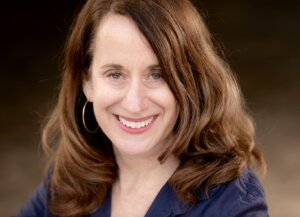In Israel, a new habit: Attending funerals of fallen soldiers you do not know
“There’s an aspect of death in Israel that is communal”
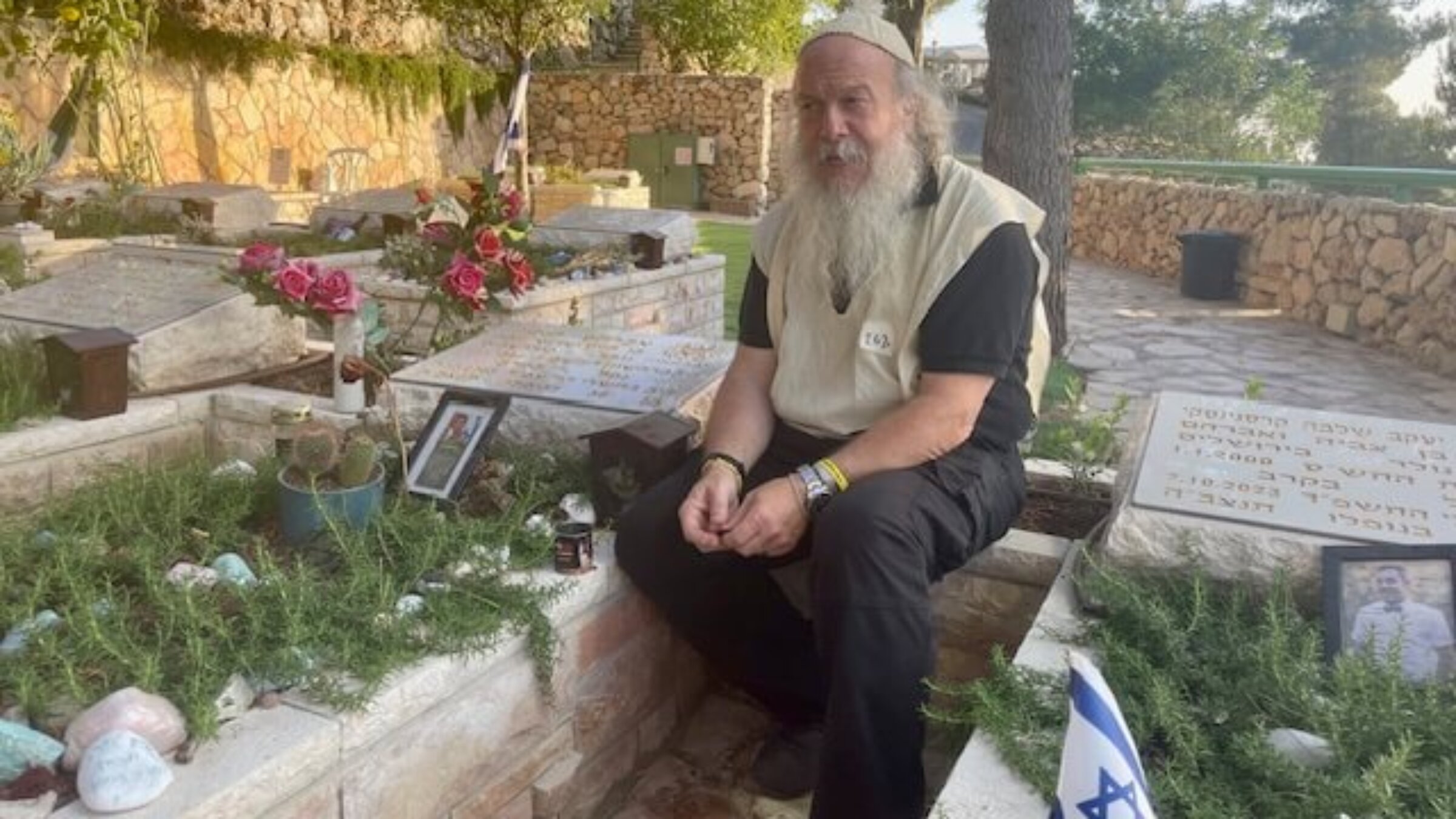
Yisrael Campbell visits the grave of a friend killed in Hamas’ Oct. 7 attack. He since has attend funerals for at least two dozen fallen soldiers on Mount Herzl, Israel’s national cemetery. Photo by Susan Greene
JERUSALEM — Some of the 2,000 mourners who crammed around the fresh grave on Mount Herzl’s northern slope one recent day had gone to school with the 21-year-old soldier being buried there, Sgt. Eliyahu Moshe Zimbalist, whom they called Eli Mo.
Others grew up with his mother in Teaneck, New Jersey; worked with his dad at the auditing and consulting firm Deloitte; or knew his brother, who has Down syndrome and buses tables at a café in Beit Shemesh, the largely religious town between Jerusalem and Tel Aviv where the family lives.

But a good portion of those who stood for nearly two hours in the 90-degree heat had no connection to Zimbalist, nor to the young man buried next to him right afterward, nor to the other two fallen soldiers whose funerals took place in the same row under the same tent later that day and night. They knew little or nothing about the men they had come to honor, except that they had been killed the day before fighting in Gaza. Some did not even know their names.
“I would not consider going for a stranger,” said Angela Stauber, who regularly checks the Israel Defense Force’s funeral notices online and makes the 12-minute walk to Mount Herzl from her home whenever she is free. “But it is our country, our army, our soldiers, and this soldier died for me, which makes him anything but a stranger.”
She is one of scores or perhaps hundreds of Israels who have made a practice of showing up to burials here and at other military cemeteries throughout the country for the past nine months.
They come not because they have to or because anyone’s expecting them, nor simply because supporting grieving families is a mitzvah — good deed — in Judaism.
Some see it as a civic duty, others catharsis, finding connection in a country wounded by months of war and splintered by political infighting.
Yisrael Campbell, a 61-year-old comedian, has been to at least two dozen funerals since the Hamas terror attack on Oct. 7.
“This may be the last remaining place in Israel where there’s no sense of fracture or division,” he told me as we stood on Mount Herzl. “Most days it seems like this country is about to break into a million pieces, but I never feel like that here.”
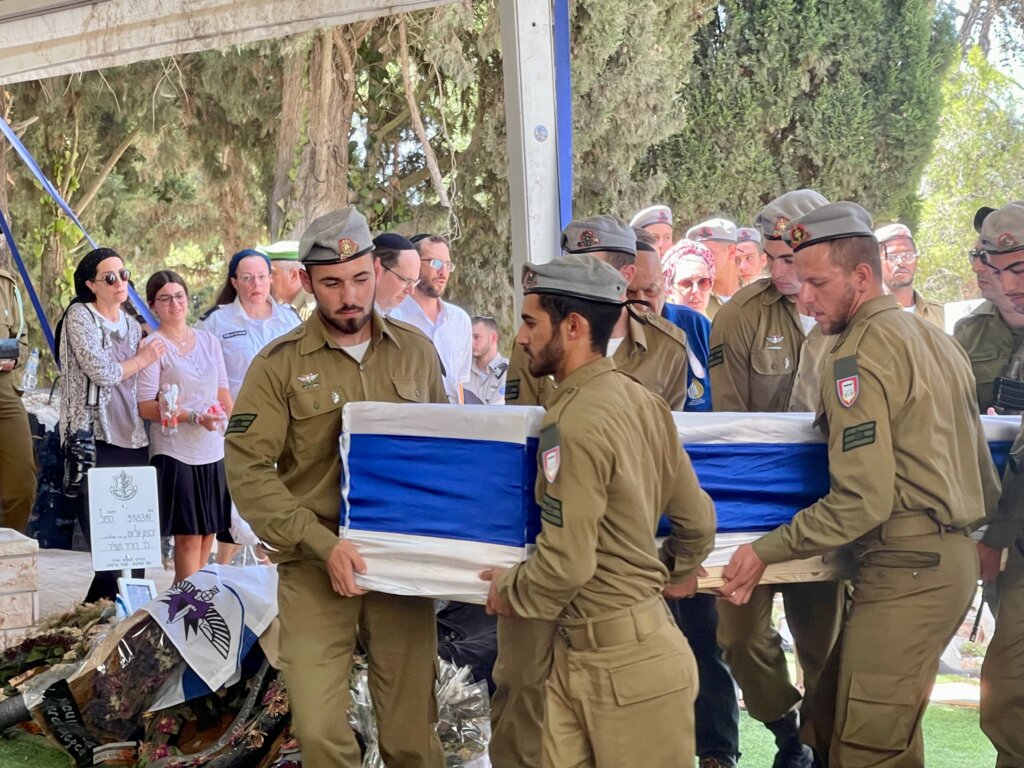
‘It’s not my specific loss, obviously’
Campbell, a convert who made aliyah nearly 25 years ago, has four children, two of whom started their military service last year, one having spent time on the ground in Gaza.
His funeral-going started almost immediately after Oct. 7, when a friend who worked as a counter-terrorism officer in Jerusalem rushed south to save lives during the massacre and was killed by Hamas fighters.
The gravesite of that friend, Avraham Henkin, is just downslope from Zimbalist’s.
Sitting next to it earlier this week, Campbell told me about what seemed like an interminable four-day wait for Henkin’s burial because he was one of 373 members of Israeli security forces killed that day. He recalled Henkin’s children saying the Mourner’s Kaddish and shoveling dirt onto his coffin. And how members of Henkins’ SWAT team were there despite their injuries from the attack.
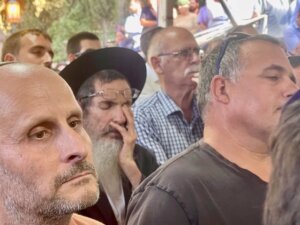
“It stays with you, seeing some of the strongest men on earth sobbing like babies,” he said.
Campbell said he soon returned to Mount Herzl for the burial of a “lone soldier” — a young person from abroad who enlists in the IDF — fearing that few would attend. He then found himself going to funerals for other soldiers he didn’t know for reasons I heard from many others.
“I just had this feeling like they’ve done their part for me, now it’s my turn to do my part for them,” he explained. “It’s not my specific loss, obviously. But it’s a way to acknowledge a life lost and the price these boys, these children, and their families are paying to our country.”
Campbell tries to stand close enough to see the grave, the soldier’s comrades carrying in the coffin and the family walking in behind. He watches the parents’ faces and wonders how they can stand it. He hears them moaning and wailing in anguish.
Those sounds often make him sob.
‘The only way I can cry’
A uniformed soldier with a walking stick and a scarred face stood at the back of the tent during Zimbalist’s burial. I saw him again, in the same place, eight days later at the burial of Sgt. First Class Malkia Gross, eight days later. He told me that he was injured in Gaza in November, and that army rules barred him from telling me his name.
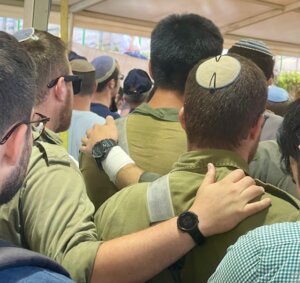
He said he’d had four surgeries and would need four more for the injuries he sustained in an explosion that took the lives of two buddies in his unit. He missed their funerals because he was still in the hospital. Now, between physical therapy and mental health appointments, he said he comes to “perfect strangers’ funerals” partly as a way to “apologize, I guess, for being the one who lived” and partly because “it is the only way I can cry.”
There is another reason, he wanted me to know after Gross’s burial on Monday.
“It’s hard to say out loud,” he said, pausing and squeezing my arm as I waited. “But I like that nobody feels sorry for me at funerals.”
‘The siren ended, and we continued the service’
Stauber, who is 67, has her routine down: Wear sneakers (crisp white, elegantly woven ones) that are comfortable to stand in. Drink plenty of water beforehand. Bring enough tissues to wipe her own tears and hand to mourners around her.
She said her attendance at the funerals was partly inspired by the fact that she had three siblings who died in the Holocaust before she was born. She estimated that three quarters of the mourners at military funerals these days, like her, never met the young people being buried.
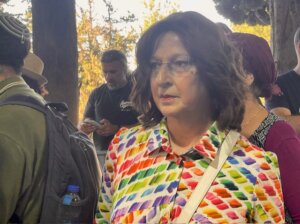
She has seen mourners faint in front of her and has attended burials in torrential rain and during a missile siren.
“They said you have to go down on the ground and cover your heads,” she recounted. “Thousands of us did, until the siren ended, and we continued with the service.”
Stauber, a cancer survivor, said her husband and some of her nine children have suggested she ease up on the funerals, noting that they take an emotional toll, and that there are plenty of other people showing up
“I tell them on the contrary, if there are thousands of people, that’s even more reason to go,” she said. “It’s uplifting and I’m accomplishing something being one of the thousands there together, as if with one heart.”
‘Maybe if I go it won’t happen to me’
David Shire, a landscape gardener in Neve Daniel, started going to the funerals as a proxy for his youngest son, who lost friends on Oct. 7 and in the early weeks of the war, but could not attend himself because he was on active duty.
That son postponed plans for his Oct. 17 wedding, and by the time he got married in January left an empty table at the reception in memory of the guests who RSVP’d yes but didn’t live long enough to be there.
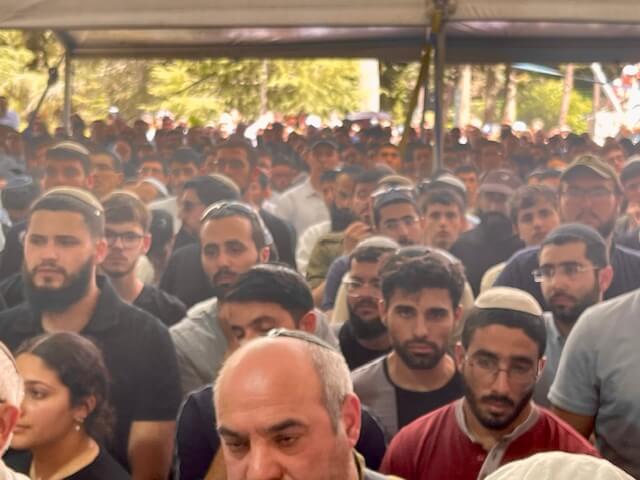
“It’s not like in Britain or America where I imagine most Jewish people wouldn’t know a soldier — here, everybody has a kid, a cousin, a friend who’s in the army,” said Shire, 64, who moved to Israel from Scotland in 1983. “They’re all our kids.”
As a traditional Jew, Shire said he does not believe in the evil eye or karma. “I do, however, know that it could be my son as easily as it could be someone else’s in that grave,” he told me, “and honestly feel powerless about that possibility. So maybe if I go it won’t happen to me, even though there’s no logic in that and these things are so cramped and crowded and sweaty that it’s almost masochistic.”
‘We show up for each other’
Campbell said he actually welcomes the intense heat and other discomforts that come with standing for an hour or two in what can seem like a mosh pit of mourners. In the numbness of wartime Israel, feeling something trumps feeling nothing at all.
As he sees it, services on this quiet mountain can be a much-needed break from the cell phone red alerts signaling incoming rocket fire, news of the increasing death toll among Gazan civilians, rising and falling hopes for hostage and ceasefire deals, domestic political skirmishes, global anti-Israel sentiment, and even a police warning that two terror suspects were on the loose in Jerusalem at that very moment,
“Nobody is thinking about any of that up here,” he said, picking some sprigs of rosemary from atop Henkin’s gravesite and inhaling their aroma.

He walked a bit up the mountain back toward the service for Gross, a 25-year-old math teacher and reserve sergeant killed in southern Gaza on June 22. A grief-struck young woman had been carried away on a stretcher earlier in the service. At the end, soldiers honored Gross with the customary military gun salute that made everybody — including Campbell, who by now knows to expect it — jump.
Each time, he said, the shots and their echoes remind him of Yehuda Amichai’s poem “The Diameter Of The Bomb.” In it, the Israeli poet shows how grief can radiate far beyond a war’s immediate impact in a ripple effect that eventually “includes the entire world in the circle.”
“There’s an aspect of death in Israel that is communal,” Campbell explained. “We show up for each other in ways people don’t in the States. It’s one of the things I love most about this country.”



